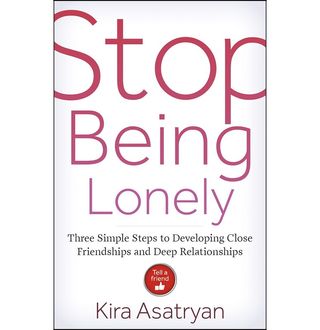
I’ve struggled with feelings of loneliness
my whole life. It’s a big part of why I decided to become a
relationship coach. I wanted to understand why some of my relationships
felt more substantial than others. I wanted to understand why sometimes I
relished being alone, while at other times being alone evoked feelings
of profound sadness.
The question I wanted to answer was this: What makes some relationships feel better than others? It was a mystery I was determined to figure out.
I've constantly alternated between desiring to be alone—which I know is classic introvert
behavior—and desiring to be with others. The thing was, I only wanted
to be with others in a very particular way: I didn’t want to chit-chat,
mingle, or even party. I wanted to feel warmth radiating between me and
the other person. I wanted to feel safe and comfortable. I wanted to
feel close.
If my relationship with someone didn’t have that element of closeness,
it tended to make me feel more isolated than just being alone. For this
reason, I found most of the popular advice about how to overcome
loneliness profoundly unhelpful: “Put yourself out there more!” the
experts exclaimed. “Relationships are a numbers game…get enough
acquaintances and you’ll eventually find yourself with some good
friendships.” That sounded reasonable enough. But it felt…exhausting.
I simply didn’t buy the idea that the best path out of loneliness is
playing a numbers game. Most of us already have people in our lives with
whom we feel that spark of connection; we just don’t know how to
properly fan the flames. We don’t know how to move from casually
interacting with someone to becoming close.
In other words, I’ve found, through much research and introspection,
that most of us who struggle with loneliness are not lacking access to
other people. That’s not the source of the pain. The source of the pain is the lack of a certain feeling in our relationships. And that feeling is closeness.
As I write in my new book, Stop Being Lonely:
“When a relationship lacks closeness, you’ll sense that the other person doesn’t really know you and/or doesn’t really care about you. Loneliness is essentially sadness caused by a lack of closeness, also known as sadness caused by distance. This is why it doesn’t work to simply surround yourself with people. You must actually feel close to them.”
So what exactly do I mean by closeness? As the quote above
implies, the feeling of closeness arises between two people when they
both feel that the other understands them well and cares about them
deeply. I call these essential qualities of closeness “knowing” and
"caring.”
Getting to know someone in a way that fosters closeness means coming
to understand that person from his or her own perspective. This is
substantially different from how we usually “know” people. We tend to
believe we know someone when we’ve interacted with them a lot and
developed our own theory of “how he is.” But to create closeness, you
must—above all else—understand how that individual sees himself or
herself.
Once you can see a person from his own perspective, the next step is
to start communicating that you care. In other words, show that you’re
interested, engaged, and invested in their happiness
and well-being. This doesn’t mean becoming “concerned” or worried about
the person's well-being—which is really just you dumping your anxieties
on someone else—it just means communicating that they matter to you.
Together, knowing and caring are a powerful combination. They say to
another person, “Not only do I see the real you, I want to keep the real
you well.” This is the message you will give and receive from close
relationships. What more could we want?
This feeling of being understood and valued—this feeling of closeness—is what you’re really craving when you’re lonely. The
great news: You can create this feeling with anyone who also wants to
feel it. Closeness doesn’t have to be something that happens randomly or
by accident—it is within your control to create. Starting now, you really can stop being lonely.

Sem comentários:
Enviar um comentário